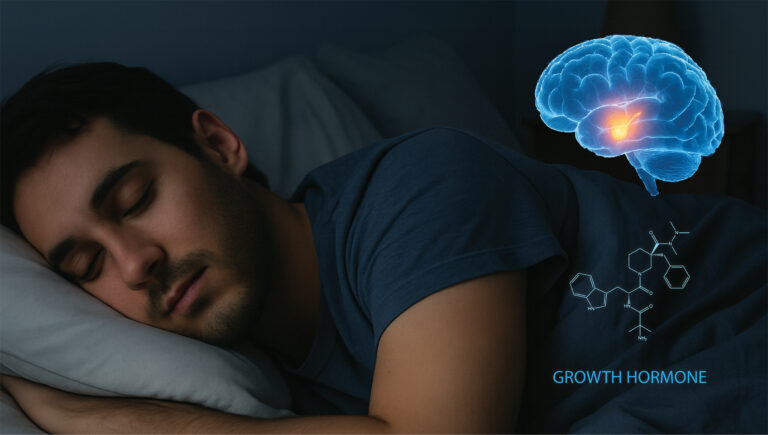Growth hormone released during sleep is critical not only for childhood growth but also for adult metabolism. A new study reveals the complex brain circuits involved, offering fresh insights into health and fitness. During sleep, the brain produces growth hormone to help build muscle and bone, as well as reduce fat. UC Berkeley research in mice reveals the brain circuits that regulate growth hormone release and a brainstem feedback mechanism that promotes wakefulness after a good night’s sleep. The molecular structure of growth hormone is at the bottom right. In a study published in the current issue of the journal Cell, researchers from the University of California, Berkeley, have dissected the brain circuits in mice that control growth hormone release during sleep and reported a novel feedback mechanism in the brain that keeps growth hormone levels finely balanced. The findings provide a map for understanding how sleep and hormone regulation interact. The new feedback mechanism could open avenues for treating people with sleep disorders tied to metabolic conditions like diabetes, as well as degenerative diseases like Parkinson’s and Alzheimer’s. “People know that growth hormone release is tightly related to sleep, but only through drawing blood and checking growth hormone levels during sleep,” said study first author Xinlu Ding, a postdoctoral fellow in UC Berkeley’s Department of Neuroscience and the Helen Wills Neuroscience Institute. “We’re actually directly recording neural activity in mice to see what’s going on. We are providing a basic circuit to work on in the future to develop different treatments.” Using state-of-the-art circuit tracing, the team found that the two small-peptide hormones that control the release of growth hormone in the brain — GHRH, which promotes release, and somatostatin, which inhibits release — operate differently during REM and non-REM sleep. Somatostatin and GHRH surge during REM sleep to boost growth hormone, but somatostatin decreases and GHRH increases only moderately during non-REM sleep to boost growth hormone. Released growth hormone regulates locus coeruleus activity as a feedback mechanism to help create a homeostatic yin-yang effect. During sleep, growth hormone slowly accumulates to stimulate the locus coeruleus and promote wakefulness, the new study found. But when the locus coeruleus becomes overexcited, it paradoxically promotes sleepiness, as Silverman showed in a study published earlier this year. “This suggests that sleep and growth hormone form a tightly balanced system: Too little sleep reduces growth hormone release, and too much growth hormone can in turn push the brain toward wakefulness,” Silverman said. “Sleep drives growth hormone release, and growth hormone feeds back to regulate wakefulness, and this balance is essential for growth, repair, and metabolic health
Thank you for reading this post, don't forget to subscribe!Sleep Strengthens Muscle And Bone By Boosting Growth Hormone Levels



